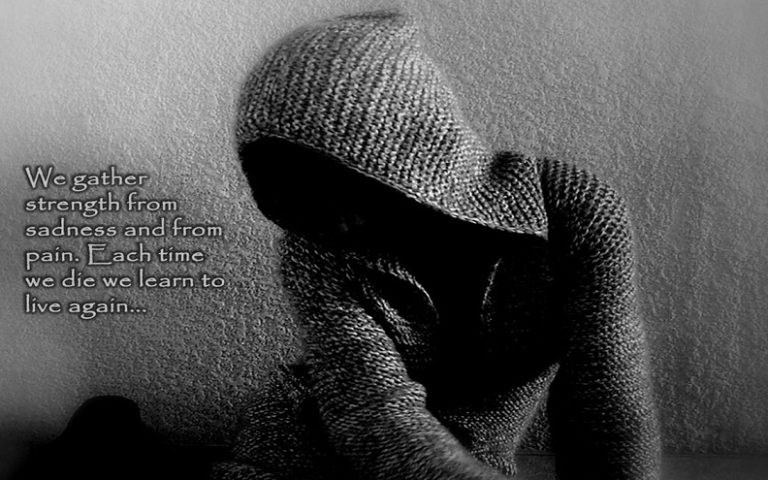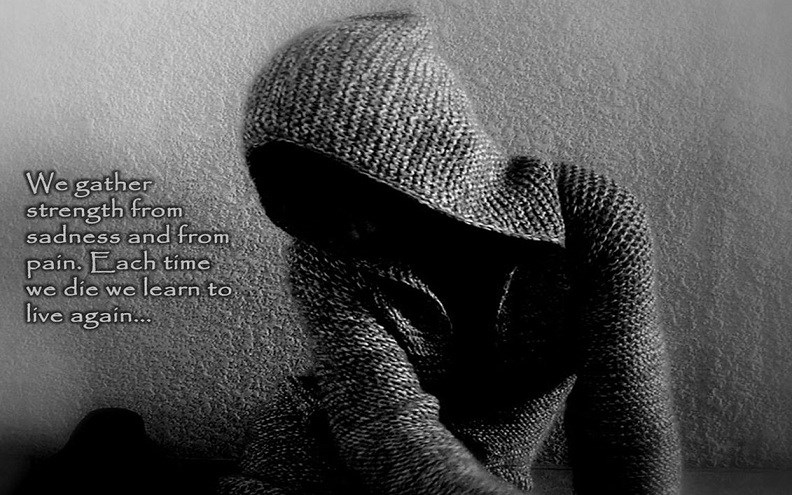 Krystal:
Krystal:
Let's face it. There is no shortage of things to be upset about these days. Whether it's grief from the loss of a loved one, a breakup, losing your job, not finding a job, losing a friendship, or losing your home, the reasons go on and on and on for us to be dismayed in life.
Yes, this is a great country, and there are those who have it much worse than we do in the various areas of our lives. Yet, we find plenty of things to complain about, and disappointment has a way of forcing itself down our throats—especially if we've worked hard for something and it failed us in the end.
For most people, life has not been blissful, and if you're mentally developed enough to read this, you've more than likely already reached the point of realization that it isn't supposed to be.
Yako:
Yes, life comes with struggles regardless and the sooner you accept that, the more empowered you will be to deal with that. An example: let's say you are standing in front of a muddy patch of land and you have to cross it in order to get to the other side. Do you just stand there bitching and moaning for eternity, or do you eventually put on your boots and take the first step to conquer this obstacle?
It's not always so straightforward, though. Sometimes you need to go through various phases and let go of a more pleasant situation to deal with a new situation that is challenging or not so comfortable.
Almost similar to the 7 stages of grief -- disbelief, denial, bargaining, guilt, anger, depression, and acceptance: I can't believe this I must have mud in my eyes is there anyone around who can help me I never should have taken this path damn this mud it's hopeless there's no way around it, gotta muster forward.
In this particular situation, the 7 stages may come and go in a matter of seconds as one seamless thought. In other situations it takes a bit longer.
Krystal:
Yes, and the notion of sadness coming in waves and there being seasons of depression that are more prevalent in certain parts of the year than others is a familiar, yet false idea. There are winter blues, birthday blues, there's summertime sadness, etc. Me, I believe life is one season of sadness and happiness dancing with each other. Generally, it is difficult to be happy when you are sad, which is exactly why the key to achieving happiness is not buying into these seasonal ideas of it, but instead, embracing the possibility that you already possess what it takes to be happy.
In order to define and give value to our blessings, we need opposing emotions and feelings to have a correlation with those blessings. Further, our sadness can be the platform of our strengths. It has the potential to make us resilient.
I recently lost my father, and watching my mother—who was very close to him—deal with the shock and unspeakable grief of suddenly living without him is not easy to witness. It's not even imaginable to understand all of what she is feeling, and the road ahead will be full of many dark and painful periods for her and everyone who is feeling his absence, including me.
But though it's only been a couple of months since his death, it has been an enlightening couple of months, with experiences that only came about as a result of my father's passing. Beautiful things have began to blossom for my mother as a result of her sadness. She has already found purpose in her grief, as well as something to avoid—depression. Her attempt to not be overwhelmed with grief has caused her to pull back layers in her life that she's wanted to pull back for years.
Think about it, how do you measure your happiness? Is it absolute, or is it based on the idea of triumphing against despair? It seems as if happiness can best be experienced through a sense of gratitude for not being as sad as you were in the same situation.
Honestly, I've gone through life generally sad about a lot of things, and have always cherished any period of time that I felt happy. Don't get me wrong, there's a silver lining to this sentiment. When I experience happiness, it is with a sense of relief, because I know my unhappiness is always nearby. So, I cherish it in an appreciative way while it's happening. What saddens you? And do you find, that it actually pushes you to achieve happiness more than if you were happy all of the time?
Yako:
I actually thought for a long time that I was emotionally disabled (perhaps I am, though). The reason I felt this way was that I was never too excited or sad about any situation. I was always equanimous, never cried, never laughed out loud, perhaps smiled here and there, but certainly wasn't known for smiling.
Well, that has changed and in particular most recently! With all of the news items regarding the new administration, I've become sadder and sadder. Two weeks ago, it all became too much to deal with for me, even after trying to avoid all this news. I was as sad as I had never been in my life and was balling my eyes out. I had never felt that sad before, seeing firsthand this much intolerance, disrespect, discrimination, bigotry ... let me stop here because the list goes on and on.
The saddest thing of all is that on daily encounters, on the subway, etc. it suddenly seemed ok for people to hurt others. It just makes me so upset and I have been numb ever since.
But that's only part of the grieving process. After the anger and depression comes acceptance. NO, I'm not talking about accepting this horrible excuse for a president -- #notmypresident. It's beyond my comprehension that many people who are or were against Trump are now suggesting that perhaps we should give him a chance. No, I'm talking about accepting that there is a situation we have to deal with and we have to deal with it now. Here are some ways:
- Write a column or blog for one :)
- Take part in protest
- Share facts (and this BK Reader column) via social media
- Make sure to vote during any election
- Write to your elected government officials
- Talk to people around you what is going on and how it affects their and your lives
- Help people in need
- Show up for someone who is not able to show up for him or herself
Krystal, I bet you have some great suggestions here as well!
Krystal:
These are great! In other areas of your life concerning sadness, disappointment, and depression, I've found it helpful to:
- Communicate verbally what is going on for you, either to a close confidant, the others involved in the situation, or yourself when you are alone
- Write down what you are feeling, wait a week, then write what you are feeling again and compare the two to see progress or stagnant behavior
- Give yourself time to be yourself, don't hold in feelings they can lead to resentment, which is worse than sadness, sometimes crying is great medicine, you can tire of it and then naturally seek for another way to cope with your feelings
- Pick yourself up when you can, it will help in the fight against depression, for we are and become what we repeatedly do
- Listen to uplifting music, it encourages you immediately, even before you realize it
- Your emotions are your own, take responsibility for them
- Position yourself to be a help to others in need, it takes the focus off of your sadness and empowers your mindset, revealing how strong you actually are
In conclusion, we can beat our upsets. We as human beings are naturally built to heal and to be of help and inspiration to each other. While that doesn't always happen, the times when we are weak are necessary in order for our strengths to exist. Giving purpose to every extreme that makes us who we are can be very effective in the end -- as well as a requirement for our healthy selves. Accepting sadness for what it truly is, rather than glorifying how it makes us feel, can breed the happiness that we are meant to experience.
Krystal & Yako




